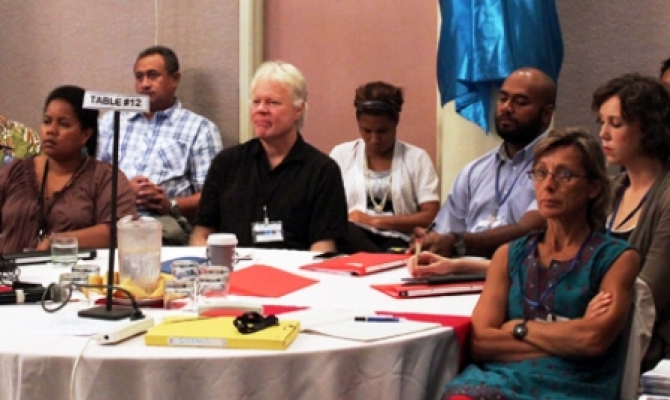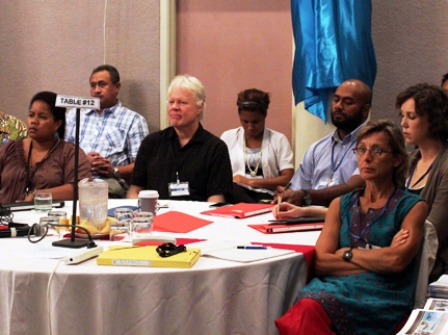
Island and Ocean Ecosystems

Participants at the workshop
Steve Pogonowski, 12 December, Suva Fiji - Potential environmental impacts from deep sea mining need to be clearly communicated from government to village level to avoid misunderstandings, presenters declared at the 4th Regional Training Workshop: Environmental Perspectives of Deep Sea Mineral Activities in Nadi, Fiji.
Private sector and civil society representatives added fresh perspectives to the discussions on environmental management, planning and monitoring of mining operations in the Central and West Pacific.
William Saleu, adviser for Nautilus Minerals - which has the license for the Solwara 1 seafloor massive sulphide mine in Papua New Guinea - said the company was trying to balance environmental concerns with potential economic benefits for the country.
He said the company would bring employment opportunities and technological advances to PNG while providing ongoing data on the mining operation to stakeholders.
"Nautilus is concerned about the environment and we aim to minimise impact on the water column and ensure there is minimal effect on coral reefs. We try to be transparent and we are working with government agencies including fisheries," Mr Saleu said.
Papua New Guinea Centre for Environmental Law and Community Rights lawyer Thomas Imal said he had heard concerns from communities about the impact mining would have on key fisheries and cultural traditions.
"PNG is a high biodiversity area. In the Solwara region we have a protected area for tuna spawning, it is over the license area where the Solwara 1 project is located," Mr Imal said.
"They also have shark calling tradition around the Solwara area, so the sounds of mining operations underwater will perhaps affect this practice."
Civil Society Forum of Tonga programme manager Pelenatita Kara said the discussions during the workshops had shown the benefits of the SPC-EU Pacific Deep Sea Minerals Project in educating Pacific Island countries on the reality of deep sea mining.
"I look into this project as a good approach to this region, bringing in experts to have discussions on this issue. There's so much propaganda out there towards deep sea mining," she said.
"We are working with the government in Tonga on public awareness and we need to take an integrated approach: it's our country, our resources and at the end of the day the community and our government have to work together."
Secretariat of the Pacific Regional Environment Programme (SPREP) environmental monitoring and governance director Sefanaia Nawadra said the workshop this week was helping to refine environmental impact assessment guidelines for better long-term outcomes.
He said SPREP was working with SOPAC, SPC's Applied Geoscience and Technology Division, to get clear guidance for member countries on the acceptable impact of mining activities.
"We were initially hesitant on deep sea mining but now we have agreed to actually work together with the DSM Project in SOPAC for the betterment of our Pacific region - especially the countries wishing to engage with this," Mr Nawadra said.